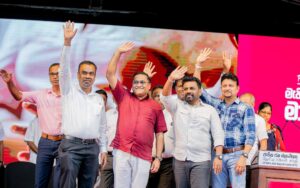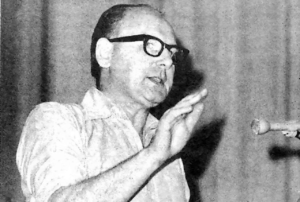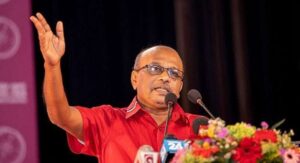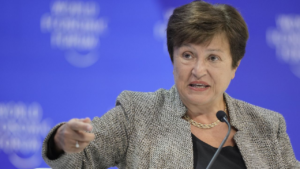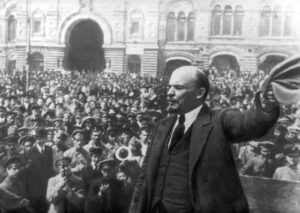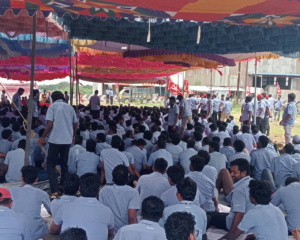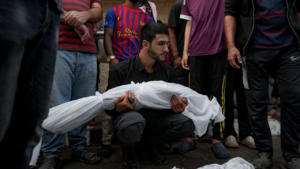By Nandana Nannetti.
“If they don’t stop drug trafficking, we have to go find them. If there is a conflict, they will have to be killed,” Public Security Minister Tiran Alas reiterated in a meeting held in Jaffna about the operation of Justice, the operation which the government claims to have launched against illegal drugs and the underworld. As a step to intensify and continue to inflict state terror on the oppressed public, the Inspector General of Police released 20 more special police battalions on 20th March, claiming to be for suppressing the underworld, and said that the underworld would be “ended” in a few months.
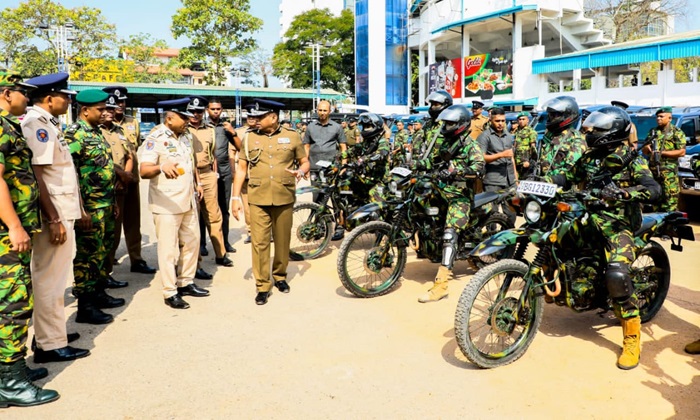
Referring to two shooting incidents reported in Pitigala and Ambalangoda on the night of 11th March, in which four people lost their lives and six others were injured; IGP Deshabandu Tennakoon said the same thing in a different manner when he announced that they (the Police) “will act to response in such a language that is comprehensible to the people involved in such acts.” He made this announcement while addressing an event in Ambalangoda.
By the time the Sri Lankan Inspector General of Police made the aforementioned statement, a suspect arrested by the Peliyagoda police the on previous day had already been shot dead. The said suspect was arrested on 10th March by the Hambegamuwa Police as a suspect in connection with the killing of a monk named Dhammarathana in Kalapaluwawe on 24th January. He was handed over to the Peliyagoda Police. According to the Peliyagoda Police, the suspect, Kalhara Dilshan of Aranagamwila, Polonnaruwa, has served in the Army Commando Force. The Peliyagoda police took him to the Lihiniya Canal area at Attanagalla, Urapola on the next day and shot him dead at around 11 pm. Newspaper “The island“ reported that, this man, who was handcuffed and taken under the protection of an armed police battalion was shot when he tried to run away, pushing a police officer to a precipice.
Thus, as the above announcements make clear, the “Operation Justice,“ is a government terror campaign that allows the police to use force up to the point of extra judicial killing of people in violation of basic human rights and existing laws.
What launched as a police operation on 17th December last year, was expanded to involve the Army too by 11th March. By the time, according to the police reports, there had been 68,931 raids across the country, and 68,577 suspects and, illicit drugs worth 850 million Rupees were arrested. This number includes many innocent people who were arrested on bogus charges. According to police reports, property worth Rs 720 million was seized by the Illegal Assets Unit. The reader should not be misled by these numbers because the so-called operation does not reach the big businessmen who run the illegal drug trade.
There is no record of Operation Justice controlling the illicit drug trade. But the operation has been extended from catching people for sexual harassments in public transport and then to rounding up beggars. One example of the nature of their ‘justice’ is reported on 26th February. One Madawalage Newton, a 69 year mason of Pagoda, Nugegoda, was arrested while waiting for his colleague in his way to work. He was arrested at the Nugegoda railway station in a police operation against “begging, by obstructing traffic”, although he confirmed his identity by showing his national identity card. Nine others were arrested with him and produced to court and then he was sent to a detention center for beggers, and then to the Magazine Prison. Relatives of Newton told the media that the prison informed the family that this elderly man, suffering from a chest pain, died at 1.30 pm on the 7th March. These incidents testify that the goal of the so-called Operation Justice is to suppress the poor and spread state terror in the society by deploying armed forces everywhere to quell the sparks of a public revolt.
In launching the operation, Public Security Minister Alas said that the justice operation in illegal drug raids will not target those who use or import drugs, but those who sell them. Regarding the launch of the operation on December 17, the minister has said on several occasions that his goal is to eliminate the drug retailers because when the drug sellers are gone, the drug users and the importers of drugs will not be able to achieve their goals. This statement is aimed at the poor people in villages and cities who are motivated to involve with illicit drug trade, because they have no other means to earn a living. On February 12, the Inspector General of Police addressed a community police committee meeting in Kalutara and said that he had received a report that “when one of the housemates was caught, the second one went to work”. He described how to continue the operation, “If someone in this business is caught and jailed, if there is a group who bought drugs from him, follow up and find who supplies them now.” If one person in the house is arrested and another person in the same house steps forward to accept the danger, it means that they are involved in serious problems of livelihood. That’s the very reason, why the drug dealers can use them one after the other.
An audio tape, said to be of a conversation between a powerful underworld officer and a police officer has recently become viral. “Do your duty as a policeman. You must do it because it is your duty. It doesn’t matter if a few drug sellers are caught and prosecuted. Don’t try to stop our business,” he said to the officer. The Public Security Minister’s plan fits exactly into this proposal.
Inquired at a media briefing announcing the expansion of the operation, about the public perception that the Operation Justice violates human rights, a police spokesperson denied it. He cited the fact that no one has filed a human rights case against the operation so far. Prosecution requires evidence. As the Police Media Spokesperson knows very well, the police conduct the operation without leaving any evidence for the victim, moving very similar to the underworld. Public complaints are ignored by the higher ups of the police. No one in their right mind would believe that the police, one of the most corrupt institutions in the country, would do justice.
The experiences exposing the hypocritical statement of the police spokesman are numerous. On January 20th, a 22-year-old innocent youth Mindika Aluthgamage was shot dead at a mobile phone shop named Three Star at Telijjawila, Matara. The owner of the shop is a young man named Dilshan Madusankha. Dilshan publicly presented facts about this crime committed by the police. He explained that the assassins came to kill him had mistakenly shot his friend when he was away. He pointed out the reasons. On August 24, 2020, Malimbada police arrested him for stealing money from a Telijjawila liquor store. The police tortured him severely and further scrutiny of the CCTV footage confirmed his innocence. The young man suffered physical disabilities. Even though the mother of the youth complained to all relevant places including the Police Commission, there was no relief. The fundamental rights case 68/2021 which they have filed has been assigned to the Supreme Court and scheduled to be taken up again on February 16. Dilshan said, he received death threats from the police to stop the legal activities and he declared through his facebook account and other media that there is no one to kill him except the police.
The most recent incident was on March 2, when a suspended police sergeant and a social media activist, Nimal Jayasekara, residing at Walakumbura Attham Niwasa in Nagoda, Galle, a whistleblower exposing police corruption, was stormed and shot with a T56, and robbed of his tab computer and mobile phone. He alleges that this was done by the Sri Lanka Police. He challenges the police to arrest the relevant weapon, persons and motorcycle, if they claim they are not involved.
It should not be overlooked that many underworld shooters and organized criminals are people with connections to the military or police. The main shooter of the gang that killed five people in Tangalle on December 21 was an ex-navy soldier. On February 17, at Ambalangoda, the gunman who was arrested in an attempt to kill a person was a soldier from the Kilinochchi army camp. An officer of the same camp, who got the contract and directed the soldier, was also arrested.
The threat to social life from the underworld is highlighted by the police in order to suppress public opposition to the actions of the police such as extrajudicial killings, filing false cases, terrorizing social life, etc. The very existence of the police, a tool of the capitalist class hostile to the oppressed people, is a threat to public freedom. It is no secret that large-scale illegal businesses cannot be sustained without the support of the police and the government at a high level. From this point of view, it is clear that, the public has lost their rights for a fearless peaceful life because of the underworld and the police; both being the arms of the capitalist society.
One example of the nature of the control that the police is maintaining on the lives of the common people, is what the Hikkaduwa police did to Gange Nishad Kumara, a 42-year-old resident of Tuduwegoda, Hikkaduwa, on March 14. Kumara is an oppressed fisherman He was arrested near his home, and the reason was not carrying his identity card with him. He was taken by force and asked to paint the police building. He was not released even though the family brought the identity card to the Police Station and confirmed his identity. The police have filed charges against him as a theft suspect because he did not finish the painting and got a lawyer to intervene on his behalf. The mission of so-called justice is to secure and develop this situation.
The “Global Initiative” says, “According to police data, crimes in 2022 (in Sri Lanka) increased by 60% monthly, and the number of petty crimes reported in January rose to 29,908 by the end of November from 1,676”. They pointed out in an article titled “The crime cost of Sri Lanka”, that, “economic stress has also generated an increase in illegal activities as measured by the Global Organized Crime Index.” Another proof is that homicides of all types rose from 273 in 2019 just before the economic crisis to 533 in 2022 at its peak.
Operation Justice did not control this tendency but exacerbated it. In the first 6 months of 2023, the number of shootings that was approximately 4 per month, has increased to 7 per month this year after Operation Justice was implemented.
The government is following the Philippine President Rodrigo Duterte’s “war on drugs” policy of 2016-2022, which has been used to suppress insurgencies. It killed between 7,000 and 12,000 poor Filipinos. Most of them were urban poor. A Human Rights Watch investigation found that the police were involved in falsifying evidence to justify extrajudicial killings.
The increase in usage of illicit drugs and enhancement of crime is a global phenomenon. The United Nations Office on Drugs and Crime has reported that 296 million people have used drugs in 2021. According to the report, it is a 23% increase from before. In the past 10 years, the number of people with mental illnesses due to drug usage has risen by 45% to 39.5 million. The drug industry is one such large market. Former UN Secretary General Kofi Annan has stated that this industry is twice the size of the world car market.
The class rule of the top 10%, which swallows 76% of the world’s income, has created a market of 296 million consumers worldwide from the youth in the bottom 50%, who receive only 2% of it. No capitalist regime can save the people from this situation. As long as capitalism exists, only the criminals needed for the respective businesses will be supplied from the oppressed sections of the society as well as from the security forces.
The only class capable of countering the attack, the working class, should be independently mobilized against this self-enhancing crime-ring. Only they are capable of rallying the oppressed sections and launch a powerful counter-attack against the calamity prepared and implemented by the capitalist states in collaboration with the trillionaire drug mafia. We call upon the workers to build up their independent organizations, where different tendencies genuinely representing the interests of the working class are mobilized, to fight back this menace, to safeguard oppressed against conspiracies of the state and to organize protests including pickets, demonstrations, public meetings, and strikes, hence launching a movement culminating in a general strike to defend the lives of the workers and the oppressed.
[This article is a slightly modified version of the article originally published here in Sinhala on March 22, 2024]

